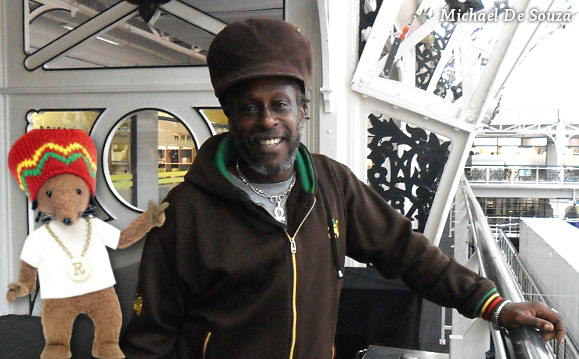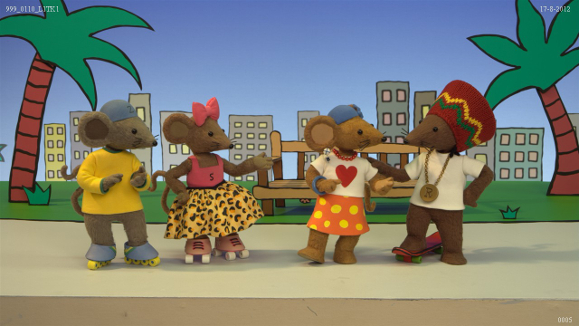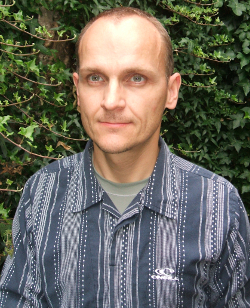Articles about reggae music, reviews, interviews, reports and more...
Interview: Michael De Souza and Greg Boardman about Rastamouse
- Home
- Articles
- Interviews
- Interview: Michael De Souza and Greg Boardman about Rastamouse

Interview: Michael De Souza and Greg Boardman about Rastamouse
"Rastamouse can help reggae. Children grow up with it"
Sampler

A reggae-loving mouse causes a stir in the UK
Michael De Souza is the trained mechanical engineer who became a swimming instructor as well as co-creator of the successful and much debated animated children’s TV series Rastamouse, a show about a reggae-loving and crime-solving mouse. United Reggae had a chat with Michael De Souza and Rastamouse producer Greg Boardman about education, success factors and the future of Rastamouse.
When Rastamouse was first aired on CBeebies in early 2011 it caused controversy and a lively debate in the UK. Some viewers reacted on the language and the cheese. The language in the series is packed with patois and slang and the characters use expressions such as “irie”, “ting”, “mon” and “wah gwaan”. The cheese was referred to by some as an expression for marijuana.
Whether the language is proper or not is a discussion for parents and academics and whether or not the cheese is a substitute for marijuana we’ll probably never know. But what is clear is that the stir surrounding the series has meant great PR for the show about Da Easy Crew – guitar player Rastamouse and his two band mates Scratchy, on bass and turntables, and Zoomer, on bongos.
The TV-version of Rastamouse is based on the children’s book of the same name, which first appeared in 2003. The stories were written by Michael De Souza and Genevieve Webster, an author and illustrator, and were in rhyme with strong Caribbean accent and patois terms.
I have seen the books for sale on reggae music store Dub Vendor, but it wasn’t until May 2012 that I actually knew what Rastamouse was. A friend of mine gave my daughter a Rastamouse DVD and the following day I watched it and loved it. At the time my daughter was too young for TV, but a few months later she would dance to the catchy theme tune whenever we watched the show.
Confident in its success
I reach Michael De Souza and the show’s award-winning producer Greg Boardman on the phone from London. It’s now been two years since the first episode was aired and the successful series has now spread around the world. Even though they were confident about the series, they were surprised by the quick response from the public.
“I was surprised by the magnitude and the speed of it. It’s a great product and I knew that it in time would have been successful, so I was not really surprised,” explains the deep-voiced Michael De Souza, who left his native Trinidad in 1960 to join his parents in London, and adds:
“A lot of children can identify with the show. It’s very simple and down to earth showing the multicultural society we’re living in.”
Make a bad thing good
Even though it’s a children series it has a broad and universal message that’ll probably appeal to any age, gender or ethnicity. Rastamouse and his friends solve mysterious crimes and aim to “make a bad ting good” and tell people to believe in themselves. As a devoted Rastafarian Michael De Souza has taken messages of unity and love from his beliefs and put them in the show. Every person can make a mistake, but should be given the chance to make amends. To make a bad thing good.
“The fundamental is being good. That’s a big influence. We’ve to respect each other and being good and doing good. The characters are good, they’re doing the right thing. Their super power is being good and making bad things good,” says Michael.
Reggae is fundamental
What also makes the show different from other children’s animated TV- shows is the ethnicity of the characters.
“The main thing is that they’re black. That’s a fundamental difference. It’s the first one on TV as I’m aware of. It’s groundbreaking,” says Michael, and adds:
“The music also makes it stand out. And the retro feel. The show looks quite different from other stuff.”
The music is, apart from crime-solving, something of a centrepiece in the show and the three main characters usually jam on a riddim in each episode.
“Reggae has been crucial in my life. It gave me an identity in an alien society. Calypso and soca are fine, that’s part of my heritage, but I grew up with reggae music and it keeps Caribbean people together,” says Michael, and continues:
“What we’ve found out is that every islander is embracing reggae music. They come together as one and have it in common”, he says and continues to explain the role of reggae in Rastamouse:
“It’s crucial and fundamental. It’s simple music, easy to introduce to children. And music also fills the daily lives for all the characters.”

Bringing families together
Before starting working on Rastamouse, Michael spent most of the past 15 years teaching swimming and it was the love of teaching and working with children that inspired him to pursue a career in writing. And the idea of mice as main characters, which has also been debated, he got from his childhood days.
“When I first came to England I lived in a building full of mice. They scared me, but now they’ve emerged again in a new time,” he says, and laughs.
The aim with the show is according to Michael to try and get families together again. He feels that it’s been lost. But he also wants the show to be educational.
“It has values. Everything children see they can learn from and it’s important with values and behaviour. The educational point of view is vital in the show and every stage on the educational side is important,” he says.
Developing the music side
Today, Michael and Genevieve Webster still contribute to the show as writers and they look at the scripts and prove them. Michael also oversees all aspects of the Rastamouse brand, something that’s probably important since Rastamouse has evolved into an industry of its own. Today you can buy Rastamouse figures and music on CD. The first Rastamouse single – Ice Popp – was put out in 2011.
“It has been a wonderful journey to develop an extension of the book. Something very real and natural,” says Michael, who continues to take the Rastamouse books into schools, museums and libraries.
He’ll also be involved in the further development of the Rocksteady Reggae School, a project that aims at teaching music performance and composition to five, six and seven year old children, a venture which Greg Boardman is also involved in. He has noticed that the children really love the Rastamouse brand of reggae.
 “You put on the theme tune and the children go mad. They sing along and really enjoy it,” says Greg Boardman, and continues revealing some future Rastamouse projects:
“You put on the theme tune and the children go mad. They sing along and really enjoy it,” says Greg Boardman, and continues revealing some future Rastamouse projects:
“A live show is in the pipe line and another six episodes are coming. We’re also developing the music side of it, like the Rocksteady Reggae School music project. The first was very successful.”
Greg also mentions possible collaborations with reggae artists and also emphasises that Rastamouse is under continual development and that the bulk of Rastamouse is the TV-series.
“I would say Rastamouse can help reggae. Children grow up with it. Rastamouse can make a big difference,” concludes Michael.
Comments actually desactivated due to too much spams
Browse by categories
Recommended Articles
Latest articles
Recently addedView all
© 2007-2026 United Reggae. All Rights Reserved. Reproduction in whole or in part is prohibited. Read about copyright
Terms of use | About us | Contact us | Authors | Newsletter | A-Z














